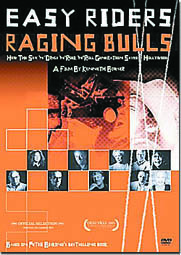
Hollywood Renegades
The behind-the-camera machinations of Hollywood have always been rich in anecdotes. None more so than during the 1970s, when a renegade bunch of filmmakers, influenced by European cinema of the time, brought an auteur approach to a then-moribund Hollywood, thereby making the industry what it is today.
An entertaining documentary based on Peter Biskind's book "Easy Riders, Raging Bulls: How the Sex 'n' Drugs 'n' Rock 'n' Roll Generation Saved Hollywood," first aired on the Trio cable channel, has been released on DVD, a 2-disc set that includes additional interview footage, plus an interview with Biskind himself.
"Easy Riders, Raging Bulls: How the Sex 'n' Drugs 'n' Rock 'n' Roll Generation Saved Hollywood"
Shout! Factory
The new footage includes some responses to Biskind's book. While all agree that, while there was a lot of open and flaunted drug taking back then -- particularly cocaine later on -- they felt the book glossed-over the euphoria and the camaraderie filmmakers and actors felt for each other. This was just as part, if not more important than, the heady atmosphere of those years.
With the exception of Peter Bogdanovich, none of the other important filmmakers profiled -- Francis Ford Coppola, Steven Spielberg, Martin Scorsese and Robert Altman in particular -- give on-camera interviews, with the occasional archival interview being the exception.
While all have made films that have transcended the '70s, the documentary also gives due to those whose idiosyncratic work defined that free-wheeling time -- people like actor-producers Warren Beatty and Dennis Hopper, producer Bert Schneider, and directors Sam Peckinpah and Hal Ashby.
Beatty's career flourished when he made such personal projects as "Mickey One" and "Bonnie and Clyde" (with director Arthur Penn), and "Shampoo" with Ashby, thanks in large part to his sex appeal and huge ego. Hopper made the definitive anti-establishment movie "Easy Rider," received box office and critical success, and then became victim of his own drug-addled lifestyle when making the ruinous "The Last Movie."
Thanks to the immense popularity of his Monkees TV series, the politically radical Schneider was able to produce the kinds of movies he wanted with complete freedom, such as "Easy Rider," Bogdanovich's "The Last Picture Show," the anti-war documentary "Hearts and Minds" and Terence Malick's "Days of Heaven."
And Peckinpah and Ashby were occasionally brilliant filmmakers ("The Wild Bunch" and "Being There," for example) who fell victim to their own personal vices that were fueled by the times.
It's these elements that make "Easy Riders, Raging Bulls" that much more of a pleasure to watch, filling in the portions when the effect of such blockbusters as "The Godfather" and "Jaws" have to be addressed.
The bonus footage on Disc 2 goes on to look into the importance of film critics Andrew Sarris and Pauline Kael in helping foment the dialogue of that time, plus a new appreciation for Hal Ashby's work, the savviness of Spielberg, and why (addressed in an indirect way) George Lucas is really not a good director, "American Graffiti" to the contrary.
Click for online
calendars and events.

